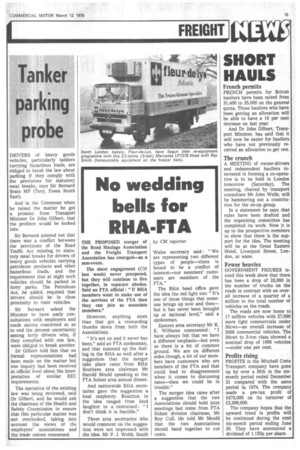No wedding bells for RHA-FTA
Page 17

If you've noticed an error in this article please click here to report it so we can fix it.
by CM reporter DRIVERS of heavy goods vehicles, particularly tankers carrying hazardous loads, are obliged to break the law about parking if they comply with the provisions for statutory meal breaks, says Sir Bernard Brain MP (Tory, Essex South East).
And in the Commons when he raised the matter he got a promise from Transport Minister Dr John Gilbert, that the problem would be looked into.
Sir Bernard pointed out that there was a conflict between the provisions of the Road Traffic Act relating to statutory meal breaks for drivers of heavy goods vehicles carrying petroleum products and other hazardous loads; and the requirement that at night such vehicles should be parked in lorry parks. The Petroleum Act, he added, required that drivers should be in close proximity to their vehicles.
Sir Bernard asked the Minister to have early consultations with employers and trade unions concerned so as to end the present uncertainty among lorry drivers who, if they complied with one law, were obliged to break another. Dr Gilbert told him that no formal representations had been made on the matter but one inquiry had been received at official level about the interpretation of similar EEC requirements.
The operation of the existing law was being reviewed, said Dr Gilbert, and he would ask the chairman of the Health and Safety Commission to ensure that this particular matter was not overlooked, taking into account the views of the employers' associations and the trade unions concerned, THE PROPOSED merger of the Road Haulage Association and the Freight Transport Association has emerged—as a non-event.
The short engagement (CM last week) never prospered, but they will continue to live together, in separate abodes. Said an FTA official: "If RHA members want to make use of the services of the FTA then they can join as associate members."
However, anything more than that got a resounding thumbs down from both the Associations.
"It's not on and it never has been," said an FTA spokesman, and that summed up the feeling in the RHA as well after a suggestion that the merger take place came from RHA Southern area chairman Mr Harold Mould speaking at the FTA Solent area annual dinner.
And nationwide RHA secretaries gave the suggestion a loud raspberry. Reaction to the idea ranged from loud laughter to a restrained : "I don't think it is feasible."
Those area secretaries Who would comment on the suggestion were not impressed with the idea. Mr P. J. Webb, South Wales secretary said : "We are representing two different types of people—there is bound to be a conflict of interest—our members' customers are members of the FTA."
The RHA head office gave the idea the red light too: "It's one of those things that someone brings up now and then— but it has never been brought up at national level," said a spokesman.
Eastern area secretary Mr K. E. Williams commented : "I have always felt that we have a different emphasis—but even so there is a lot of common ground. We are on different sides though, a lot of our members have customers who are members of the FTA and that could lead to disagreements when it comes to discussing rates—then we could be in trouble."
The merger idea came after a suggestion that the two Associations should hold joint meetings had come from FTA Solent division chairman, Mr Roy Cull. He told Mr Mould that the two Associations should band together to cut costs.
















































































































